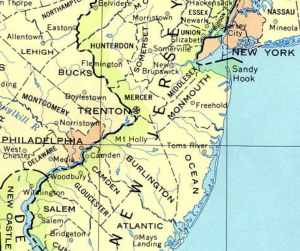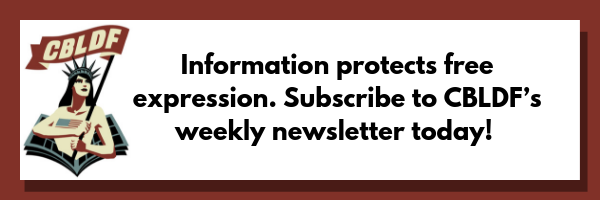 Earlier this year, two high schools in the North Hunterdon-Voorhees School District in New Jersey restricted access to Alison Bechdel’s graphic memoir Fun Home against their own policies. The restriction was overturned at the end of February after CBLDF, co-sponsors of National Coalition Against Censorship’s Kids Right to Read Project (KRRP) wrote a letter to Superintendent Jeffrey Bender defending Bechdel’s acclaimed memoir and the students at North Hunterdon-Voorhees School District’s right to read. Shortly after this victory, policy 2530 was rewritten in a very restrictive way, removing mentions of creativity, relevancy to the world we live in, and changing drastically the decision making hierarchy to only involve one person: Superintendent Bender.
Earlier this year, two high schools in the North Hunterdon-Voorhees School District in New Jersey restricted access to Alison Bechdel’s graphic memoir Fun Home against their own policies. The restriction was overturned at the end of February after CBLDF, co-sponsors of National Coalition Against Censorship’s Kids Right to Read Project (KRRP) wrote a letter to Superintendent Jeffrey Bender defending Bechdel’s acclaimed memoir and the students at North Hunterdon-Voorhees School District’s right to read. Shortly after this victory, policy 2530 was rewritten in a very restrictive way, removing mentions of creativity, relevancy to the world we live in, and changing drastically the decision making hierarchy to only involve one person: Superintendent Bender.
The Original Policy
CBLDF’s original post about Fun Home’s removal reviewed policy 2530 extensively. Challenges to literature in schools that don’t adhere to their own internal policies are more likely to fail. Policies are often in place to protect books and free expression, not protect censorship from critique.
The original policy 2530, in place since 2001 (emphasis mine),
Policy for Media Selection
The North Hunterdon-Voorhees Regional High School District Board of Education hereby declares it is the policy of the North Hunterdon Regional High School District to provide a wide range of instructional materials on all levels of difficulty, with diversity of appeal, and the presentation of different points of view and to allow the review of allegedly inappropriate instructional materials through established procedures.
Objectives of Selection
In order to assure that the school media program is an integral part of the educational program of the school, the following selection objectives are adopted:
- To provide materials that will enrich and support the curriculum and personal needs of the users, taking into consideration their varied interests, abilities, and learning styles;
- To provide materials that will stimulate growth in factual knowledge, literacy appreciation, aesthetic values, and ethical standards;
- To provide materials on opposing sides of controversial issues so that users may develop under guidance the practice of critical analysis;
- To provide materials which realistically represent our pluralistic society and reflect the contributions made by these groups and individuals to our American heritage;
- To place principle above personal opinion and reason above prejudice in the selection of materials of the highest quality in order to assure a comprehensive media collection appropriate for the users;
- To provide exposure to information technologies and techniques to enable students to participate in life-long learning skills.
Responsibility for Selection
Although the North Hunterdon-Voorhees Regional High School District Board of Education Is legally responsible for the operation of the schools, the responsibility for media selection materials is delegated to the certificated library/media personnel
While selection of materials involves many people, including library/media specialists, teachers, students, supervisors, administrators, and community persons, the responsibility for coordinating and recommending the selection and purchase of media rests with the certificated library/media personnel. Responsibility for coordinating the selection and purchase of textbooks rests with appropriate department chairpersons, principals or textbook evaluation committees.
Criteria for Selection
Educational goals of the local school district, individual student learning modes, teaching styles, curricula needs, faculty and student needs, existing materials and networking arrangement should be considered in developing the media collection. Guidelines for the evaluation and selection of curricula resources are listed.
- Be relevant to today’s world;
- Represent artistic, historic, and literary qualities;
- Reflect problems, aspirations, attitudes, and ideals of a society;
- Contribute to the objectives of the instructional program;
- Be appropriate to the level of the user;
- Represent differing viewpoints on controversial subjects;
- Provide a stimulus to creativity.
Technical materials should:
- Be of acceptable technical quality; clear narration and sound, synchronized pictures and sound;
- Be readable; typographically well-balanced.
The New Policy
Now those links to the district’s policy 2530 point to a different set of rules, updated in March 19, 2019 – just weeks after Fun Home was retained. The new policies tell a very different story, putting priority on the Superintendent, not on the students. For the new policy 2530 (emphasis mine),
The Board of Education shall provide resource materials to implement district and school educational goals and objectives as student needs dictate and district resources permit. Such materials include reference books, other supplementary titles, maps, library print and non-print materials, and other sources of information for use by students that are not designated as textbooks.
The Superintendent shall be responsible for the selection and maintenance of all resource materials, in accordance with the following standards:
- Material will be suited to the varied interests, abilities, reading levels, and maturation levels of the students to be served;
- Wherever possible, materials will provide major opposing views on controversial issues so that students may develop under guidance the practice of critical reading and thinking;
- Wherever possible, materials will represent the many religious, ethnic, and cultural groups and their contribution to American heritage;
- Materials will be factually accurate and of genuine literary or artistic value;
- Materials will be of a quality and durability appropriate to their intended uses and longevity;
- Materials will relate to, support, and enrich the courses of study adopted by the Board.
The Superintendent will develop regulations for the selection of resource materials that provide for the effective consultation of teaching staff members at all appropriate levels; ensure that the Board’s budgetary allotment for resource materials is efficiently spent and wisely distributed throughout the instructional program and the district; and ensure an inventory of resource materials that is well balanced and well rounded in coverage of subject, types of materials, and variety of content.
The Superintendent will evaluate the continuing effectiveness and utility of resource materials and recommend to the Board the removal of those materials that no longer meet the standards set forth in this policy. Any request for the removal of resource materials will be governed by Policy No. 9130 on public complaints.
Analysis
With this new language, far too much control is granted to the Superintendent over instructional materials. The previous policy “delegated” responsibility “to the certificated library/media personnel” which presumably made at least a few different people responsible for instructional materials. Regardless of the Superintendent’s qualifications, it doesn’t benefit the students or the faculty to have one person solely responsible for instructional materials, even the fairest person in the world has subconscious biases. Collection and curriculum development benefit from many people, with a variety of life experience, being involved to make sure that no one narrative is prized above any other. It is difficult to know what we don’t know, so policies must prioritize collaborative networks to ensure that instructional materials are a fair representation of the world we actually live in.
It’s also disturbing that the certain instructional material goals were removed from the policy. The removal of the criteria: “be relevant to today’s world” is particularly worrisome. It’s critical that students be allowed to read and talk about current issues they are facing as well as issues current to their communities. It’s books like Fun Home and The Hate U Give that tackle modern issues head-on. These books face a high number of challenges, but that’s because teachers want to include books in the curriculum that not only teach, but offer a safe space to explore tough topics, and engage students in issues that matter to them.
Losing the criteria: “provide a stimulus to creativity” for instructional materials is disheartening. Sure creativity is not necessary to education, in the way some schools don’t believe art or music to be necessary to education. But teachers work hard to include materials that spark creativity in their students. Graphic novels especially can accomplish this while still meeting common core standards, and that just one of the many reasons more and more teachers are including them in their lesson plans. A move away from stimulating creativity is a red flag that the policy isn’t concerned with the students’ engagement or learning environment. Policies must be utilized to serve the students, not the administration.
According to National Coalition Against Censorship, who have been following this issue closely, the following image is a screen cap from the policy history comparison tool available within the board’s online policy manual. It is looking at the policy for reconsideration of instructional materials, a subsection of the above policy 2530.
Note the removal of “North Hunterdon-Voorhees Regional High School District Board of Education supports principles of intellectual freedom inherent [in] the First Amendment” as well as “In the event that materials are questioned, the principles of intellectual freedom, the right to access of materials and the integrity of the certified library/media personnel must be defended.” While every school board policy is different, and all might not mention the First Amendment and intellectual freedom, the removal of these things is highly suspect.
Lastly, the original policy 2530 helped lead a path to victory for the critically acclaimed graphic novel Fun Home to be retained in the recent challenge. With these changes in place, there is no guarantee that the next comic or book will fare so well. Without proper policies in place to defend free expression and students’ right to read it is all too easy to foster an environment without intellectual freedom where censors feel at ease.

